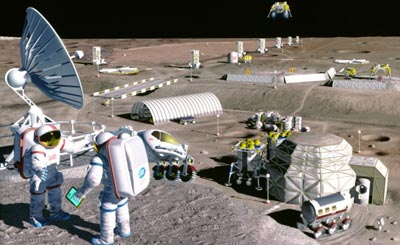Flu to the Moonby Sam Dinkin
|
| Conservatively, the flu costs the people who die from it over $50B/year and maybe another $5B in lost work from people who survive. Compare that to annual hurricane damage of $5B/year and 160 deaths. |
The management of the flu is also a canonical study in risk. About 36,000 people die from the flu every year. Most of the people who die are 65 and older. 152 who died in the 2003-2004 flu season in the US are under the age of 18. Age 6-23 months is a high-risk time according to the CDC. If we compare flu to hurricanes and asteroid strikes we find that the flu is much more deadly than hurricanes. If we put a $10-million figure on the value of a human life, then flu costs the economy $360 billion each year. This is probably high because the quality of life years that are saved for those 65 and older is fewer than those who are under 18. Suppose that the average person dying of the flu is dying halfway between 65 and their expected lifespan. IRS puts the life expectancy of a 75-year old at 12.5 years. So that would be 1/7 of their life lost if they fall to the flu this season. So conservatively, the flu costs the people who die from it over $50 billion a year and maybe another $5 billion in lost work from people who survive. Compare that to annual hurricane damage of $5 billion a year and 160 deaths.
If government wants to prevent people from dying from the flu, it should probably buy more flu shots than necessary. Flu vaccine companies make maybe $20 a dose. That’s $2 billion for 100 million doses. With that level of benefit to cost ratio, it makes sense for the government to buy an extra 50 million doses and give them away to other countries in years that no batch fails. For companies to invest in extra doses of the flu, the price would have to be higher than $20 a dose.
If companies bid for a flu capacity credit that they would receive if they produce a certain number of doses, there might be a sufficient number of doses every year. I was retained by and recommended just such a capacity credit auction to NEPOOL, PJM and NYISO to help them from falling into a shortage situation in electricity like California. Another choice that worked (albeit somewhat suboptimally) was to have local electricity monopolies.
The Moon may have the same issue as malaria and the flu. There is insufficient interest in the Moon for companies to invest in transportation capacity. Even with a $500-million prize, it might not be enough. They face an uncertain competitive situation. By offering a monopoly on space transport or at least a limited number of franchises, that may be a sufficient upside to change the nature of the game from one where the upside has to be shared to one where it can be captured by the firm or few firms with franchises.
| The Moon may have the same issue as malaria and the flu. There is insufficient interest in the Moon for companies to invest in transportation capacity. |
Even if clear title can be provided to the Moon it might not be enough. Wasser thinks only Lockean labor mixing will allow anyone to claim the Moon. I think international negotiations can allow courts to recognize claims to the Moon that could be deemed to be held in common by all Mankind and auctioned by the UN or some other international organization with the proceeds going as a lunar transportation subsidy or perhaps a flu shot subsidy.
Another theory of property following Greg Nemitz’s Eros Project would say that the surveys made by NASA and others have been abandoned and that anyone can therefore claim the Moon.
The most pragmatic statement I can make is that lunar property rights are what the courts say they are. If the courts say I can do telepossession, then I can. If that takes amending the Outer Space Treaty, then fine, let’s do it. I agree to disagree with Wasser about whether that is needed or not. I will bet you one lunar acre that it does not, Mr. Wasser.
The Moon may need a more intensive approach to private transportation and colonization just like malaria is getting. The Bill and Melinda Gates foundation is trying to make the economics of malaria work with major donations to fund treatments and cures. They are offering neither prize nor franchise. If the problem of private transportation to the Moon is an orphan problem, like malaria was before the Gates Foundation adopted it, then it may require a solution like an electricity monopoly, an auction, or the approach by the Gates Foundation. My suggestion to Bill Gates is adopt the flu and invest in space development.
| Lunar property rights are what the courts say they are. |
If an auction were held for real estate on the Moon, it would have a positive price. There are companies that have the in-house capability now to develop lunar transportation. If an all-or-nothing bid succeeded in winning the auction, the bidder would have clear title to the entire Moon and strong incentive to develop transportation. This would solve the upside problem for the winner. I disagree with Alan when he says “No reasonable investor would bid $20,000, let alone $2,000,000,000, for such a franchise until after the transportation actually existed.” In any case, lunar acreage will be worth even less than the cash that people would be willing to bid for the option to develop the transportation to make it worth something.
But the Space Settlement Initiative is the best legislation out there. So I support it. I also support amending the Outer Space Treaty so that I can exclude people from visiting me on the Moon and giving me the flu.
